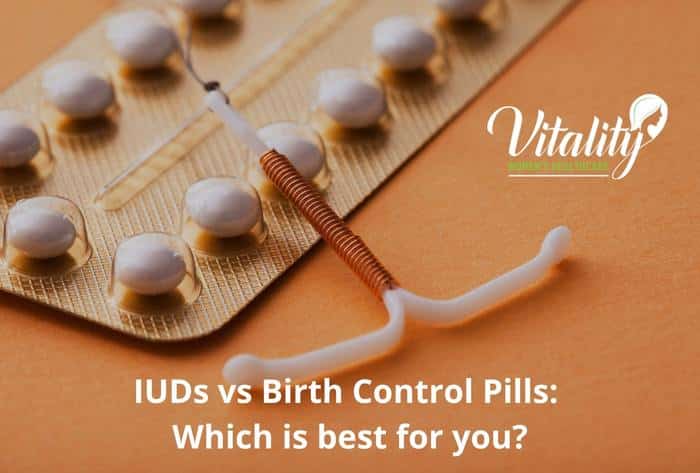Deciding on a form of birth control can be a daunting task with the many different varieties of options, brands, and variations. What works for one person may not work for the other, so it’s important to make informed decisions to decide which option is best for you. It’s not uncommon for women to try different forms of birth control; however, understanding how each works and the common side effects is beneficial and is the first step to making the right decision. Two of the most popular forms of non-permanent birth control are IUDs (Intrauterine Devices) and of course, the birth control pill. IUDs will provide a long-term solution to preventing unwanted pregnancy, while birth control pills can be offered without any procedure needing to be done. So which of these is right for you? Let’s find out.
Intrauterine Device (IUD)
An Intrauterine Device, more commonly known as an IUD, is a small T-shaped device implanted into the uterus as a method of contraception. This is long-term, reversible, and one of the most effective birth control methods available. An IUD is a great option for women who wish to become pregnant in the future, but desire effective prevention of pregnancy for the coming years. Being reversible, they can be removed at any time if you wish to become pregnant, unlike tubal ligation. This method of birth control needs to be removed by a health care provider. A copper IUD is a great choice for women who don’t like the idea of using hormonal birth control which can cause mood swings, headaches, breast tenderness, bloating, nausea, and weight gain.
Effectiveness of an IUD
This is a highly effective contraceptive method when used correctly and can help with irregular bleeding and regulate your menstrual cycle. It is also very safe and has few side effects.
- 99% effective at preventing pregnancy
- Low maintenance
- Long-term, up to 12 years depending on the IUD
- Less painful periods
- Lighter periods
- Helps with irregular bleeding
- Can be used as emergency contraception
Disadvantages of an IUD
IUDs come with common side effects that vary depending on the type of implant you receive. These side effects should subside overtime after your initial insertion and most are caused by hormonal IUDs.
- Insertion can be uncomfortable
- Changes in menstrual cycle after initial insertion
- Weight gain
- Breast tenderness
- Changes in mood
- Removal requires medical professional
There are some additional risks associated with IUDs; however, these are not commonly reported. This includes expulsion, infection, pain during insertion, and pelvic inflammatory disease (PID).
Birth Control Pills
The pill is the most common form of birth control. A birth control pill contains a combination of the hormone progestin as well as estrogen that prevent ovulation. These pills work by blocking the release of eggs from the ovaries, stopping pregnancy. They are taken daily and there are many different brands. Some contain only progesterone while others include both estrogen and progesterone. These pills may be combined with other medications such as antibiotics, antidepressants, or antihistamines. They are 91% effective at preventing conception; however, this is due to improper use such as forgetting to take it regularly.
Effectiveness of Birth Control Pills
Birth control pills are one of the most accessible forms of birth control, and provide benefits beyond preventing pregnancy, similarly to IUDs. They are also more effective than barrier methods such as condoms.
- 91% effective at preventing pregnancy
- Can help regulate menstrual cycle
- Reduce cramps, PMS, and anemia
- Can help with acne breakouts and unwanted hair growth
- Prevent ovarian cysts
- Relieve endometriosis symptoms
- Can be used as emergency contraception
Disadvantages of Birth Control Pills
Just like every medication, oral contraceptives come with a range of side effects and risk factors, and may not be a suitable option for every woman. It’s important to note that the side effects of birth control may be temporary or may not be experienced by some.
- Spotting and bleeding between periods
- Failure to take oral contraceptives regularly increases risk of pregnancy
- Nausea
- Headache
- Breast tenderness
- Bloating and weight gain
- Changes in mood
Which method is right for me?
If you’re looking for a reliable way to prevent pregnancy, then an IUD is the ideal choice. The IUD is a long-term, reversible solution that will protect you from pregnancy for several years. If you want to avoid taking birth control pills, then an IUD could be a good alternative. Because pills are a high maintenance type of birth control, the failure rate is higher than IUDs; however, this is usually caused when you forget to take your daily dose. In addition, if you decide to get pregnant in the future, you won’t need to worry about having to go through a removal procedure. An IUD is a safe, effective, and long-term contraceptive method. Once inserted, an IUD cannot be removed without medical intervention, but can be removed anytime you desire to become pregnant. In contrast, birth control pills are highly dependent on user compliance and can be the daily pill easily forgotten. This means that even though they are very effective at preventing pregnancy, they aren’t always 100% reliable. The decision to choose one over the other should be based on what works best for you. If you would like to talk about birth control options in a safe and nonjudgmental setting, call Vitality Women’s Healthcare on (940) 286-4344




